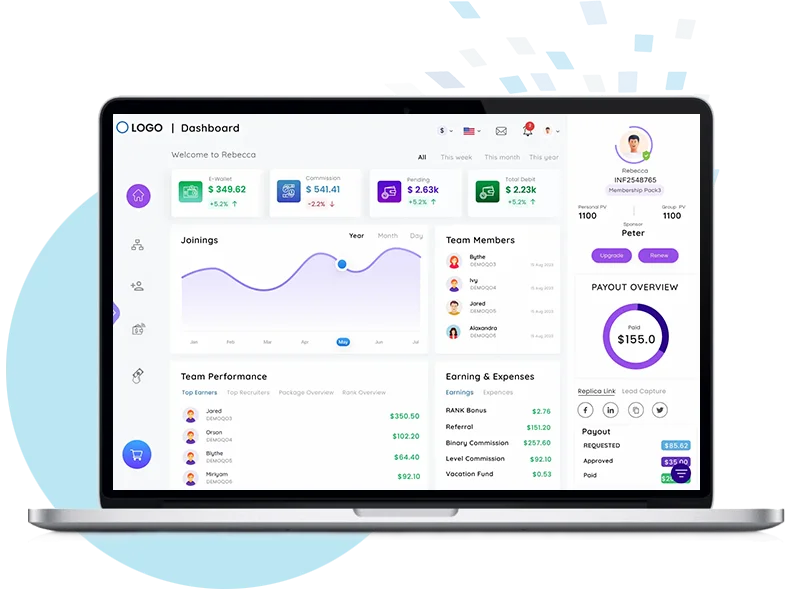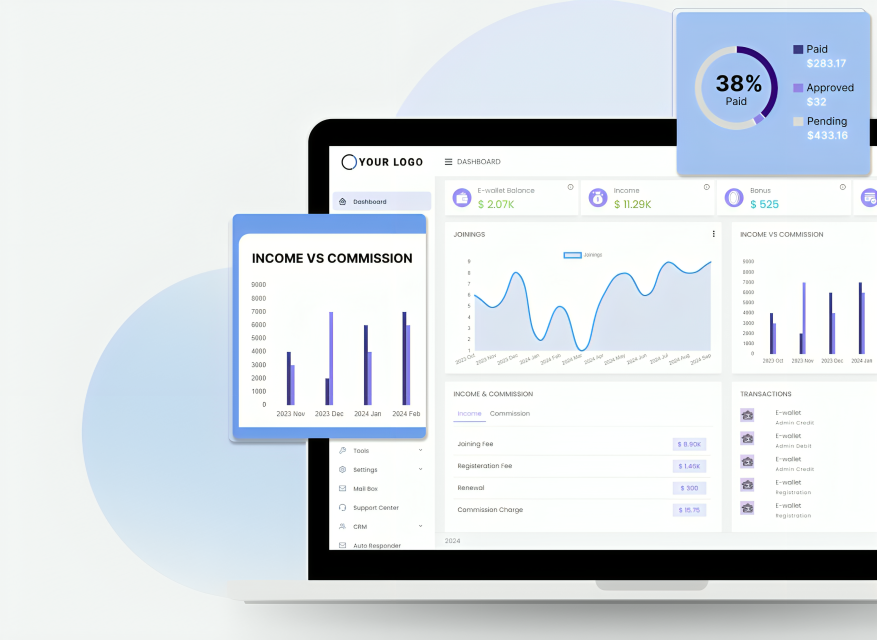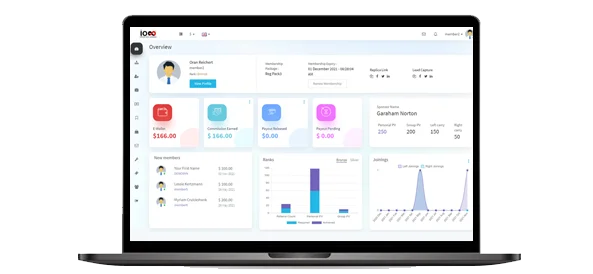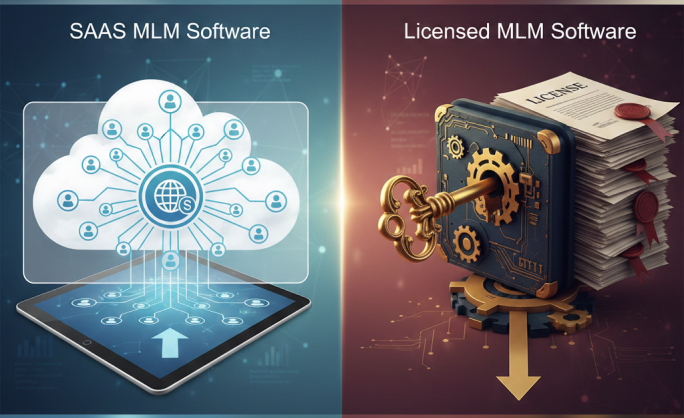Whether you’re managing thousands of distributors across continents or entering new international markets, one thing is certain: your software infrastructure can either accelerate your growth or hold it back.
This is where the right MLM software comes into play. It’s not just about tracking commissions or managing downlines. Serious MLM growth requires solutions that adapt to rapid scaling, meet complex compliance requirements and support remote teams in real time.
That’s led many businesses to a pivotal decision: cloud-based vs. on-premise MLM software. Cloud solutions often promise lower upfront costs and quicker setup. But here’s the truth: cloud isn’t always the best fit, especially for global MLMs with stringent data laws, performance inconsistencies or legacy system integrations.
Before defaulting to cloud-first, it’s crucial to evaluate both deployment models through the lens of security, scalability, sovereignty and long-term cost. In this blog, we will break down both models to help you make a strategic, growth-ready decision. Let’s tackle this now!
Understanding MLM Software Deployment Options
As MLM companies grow and expand into new markets, their software needs to support not only distributor operations but also region-specific legal and technical requirements. Two primary deployment options exist- cloud-based and on-premise- each offering distinct advantages and trade-offs.
To help you determine which approach best suits your organization’s goals and infrastructure, let’s break down what each model entails and how they compare.
Cloud-Based MLM Software
Cloud-based MLM software is a type of software, often referred to as Software as a Service (SaaS), that helps businesses manage and build multilevel marketing or network marketing workflows. It is hosted on the cloud and accessed by users via the internet, eliminating the need for on-premises servers and infrastructure. The MLM company subscribes to use the software rather than owning and managing it on-site.
Key Features & Benefits
-
Automatic Updates & Maintenance
The software provider handles all updates, bug fixes and maintenance tasks, ensuring the system is always up-to-date.
-
Minimal Hardware Requirements
Since everything in cloud-based MLM software is hosted in the cloud, businesses don’t need to invest in heavy infrastructure or IT staff to manage servers.
-
Quick Scalability
Cloud-based MLM software is easily scalable to accommodate business growth. You can add more users, branches or features without major changes to the setup.
-
Remote Access
The software is accessible from anywhere with an internet connection, enabling remote teams, global distributors and sales representatives to operate smoothly.
-
Lower Initial Costs
There is no need for large upfront investment in infrastructure in a cloud-based MLM software which can be more manageable for startups or small businesses.
-
Data Backup & Security (Provider-dependent)
Data is backed up regularly and security is handled by the provider though it’s important to ensure they meet high standards for compliance and protection.
Cloud-Based MLM Software is Best For:
Startups, rapidly growing MLM businesses and companies looking for lower maintenance overhead and high flexibility.
Read More: Our complete guide to MLM software development will help you understand crucial features and provide tips for selecting the right development partner.
On-Premise MLM Software
On-premise MLM software is a type of software that is deployed and operated directly on a company’s own servers and internal infrastructure. In this setup, the business takes full responsibility for acquiring, installing and maintaining the software, along with managing the necessary hardware and IT systems. This approach differs from cloud-based MLM software, which is hosted and maintained by an external service provider.
Key Features & Benefits
-
Full Control
-
High Customizability
-
In-House Data Storage
-
One-Time Cost Model
-
No Internet Dependency
Companies have complete control over the system, including software updates, integrations and how data is stored and accessed.
On-premise MLM software offers greater flexibility to customize the software according to specific business models, compensation plans, etc.
Sensitive data remains within the company’s own servers, which can be critical for businesses concerned with data privacy or regulatory compliance.
Typically involves a larger upfront investment, but can be more cost-effective over the long term if the system doesn’t require frequent updates or scaling.
Can be designed to operate locally without full internet access, which may be useful in regions with unreliable connectivity.
On-Premise MLM Software is Best For:
Established MLM businesses with in-house IT teams, strict data governance policies or highly customized software requirements.
Cloud-Based MLM Software v/s On-Premise MLM Software: A Comparison
| Feature | Cloud-Based | Cloud-Based |
|---|---|---|
| Cost Structure | Subscription-based | One-time license + infrastructure |
| Setup Time | Fast | Longer, more technical |
| Customization | Limited | Extensive |
| Maintenance | Handled by provider | Handled in-house |
| Accessibility | Anywhere via internet | Local access (or via VPN) |
| Security | Provider-managed | In-house security controls |
| Scalability | High (easy to expand) | Slower, infrastructure-bound |
Pros and Cons of Cloud-Based MLM Software
When considering software solutions for a network marketing business, cloud-based platforms are often seen as a flexible and cost-effective choice. However, while cloud-based MLM software brings significant advantages, it also comes with certain limitations. Understanding the pros and cons is essential to determine if this model aligns with your business needs and long-term goals.
Let’s look at the advantages and disadvantages of cloud-based MLM software in detail:
✅ Advantages of Cloud-Based MLM Software
Accessible from Anywhere
With cloud-based MLM software, you can access your data anytime, anywhere, using any internet-connected device. It allows users to stay connected while on the move, ensuring they remain informed and in control no matter where they are.
Lower Upfront Costs
There is no need to purchase expensive servers or invest in IT infrastructure as most cloud providers offer subscription pricing models. You simply pay for the features and storage you actually use.
No Server Maintenance
Your team doesn’t have to worry about server downtime, hardware failures or managing system updates in a cloud based MLM as everything is handled by the cloud based MLM software provider.
Automatic Software Updates
The cloud based MLM software provider ensures that the software is always up-to-date with the latest features, bug fixes, and security patches all without causing any disruption to your operations.
Rapid Deployment & Scalability
Cloud-based MLM platforms offer quick and efficient setup, allowing your system to be fully operational within days. This rapid deployment enables businesses to get started without delays and begin operations or expansion immediately.
Offsite Data Backup
Since data is a vital asset for any business, secure storage and quick restoration are essential. Cloud-based MLM software services typically offer regular automated backups, helping prevent data loss in case of local disasters or device failure.
Disadvantages of Cloud-Based MLM Software
Data Security Concerns
Your sensitive data is stored on third-party servers, which raises compliance and data security issues in regions with strict data protection laws (like GDPR) and introduces risks.
Limited Customization
Many cloud solutions come with limited flexibility. For MLMs with complex, unique compensation plans or niche workflows, customization options may be insufficient.
Internet Dependency
Full functionality depends on a stable and fast internet connection. In regions with unreliable connectivity, system access can become a challenge.
Potential Global Scalability Challenges
While cloud platforms are scalable, they may face performance issues when used by widely distributed international teams, especially if servers aren’t optimized for wide access.
Vendor Lock-In Risks
Once your business is built on a specific cloud solution, it can be difficult and costly to migrate to another system if your needs outgrow it.
Read More: Providing instant, automated responses, chatbot integration is a vital communication feature in MLM software.
Pros and Cons of On-Premise MLM Software (H2)
When evaluating software options for a direct selling business, on-premise solutions present a compelling choice for organizations that prioritize control, security and customization. However, this setup also demands a significant upfront investment, technical expertise and longer deployment time.
Let’s look at the advantages and disadvantages of on-premise MLM software in more detail:
✅ Advantages of On-Premise MLM Software
Full Control Over Data
All company and distributor data is stored on your internal servers, giving you total ownership and control. This is particularly valuable for complying with strict data sovereignty laws.
Extensive Customization Capabilities
On-premise setups allow for deep customization at the code level which is Ideal for MLM businesses with complex commission structures.
Long-Term Cost Efficiency for Large Enterprises
While the upfront costs are high, the long-term TCO (Total Cost of Ownership) may be lower for large companies that plan to run the system over many years.
Better Integration with Internal Systems
Easier to directly integrate with internal ERP, CRM, accounting systems or in-house reporting tools without dealing with API or cloud vendor limitations.
Greater Security Customization
Companies can implement advanced, business-specific security measures that go beyond what a cloud provider offers by default.
❌ Disadvantages of On-Premise MLM Software
High Upfront Infrastructure Costs
Requires significant capital investment in servers, networking equipment, and software licenses. It also includes physical space, cooling and power needs, which can add up quickly.
Requires a Skilled IT Team
Setup, ongoing maintenance, patching, security and support all need to be handled in-house. This can increase payroll costs and may require hiring dedicated personnel or consultants.
Accessibility Limitations
Remote access often requires VPNs or additional secure gateways, which can be cumbersome for distributed sales teams especially in fast-moving or mobile-first environments.
Longer Deployment Time
Implementation may take weeks or months due to the need to purchase hardware, configure software, and handle data migration manually.
Manual Software Updates
You are responsible for applying updates and patches, which can lead to security vulnerabilities or compatibility issues if not managed proactively.
Top Cloud MLM Software Trends
In 2025, key technology trends are shaping the future of cloud-based MLM software platforms, emphasizing mobility, modern payment methods and smarter support systems.
Here’s a look at the top 7 trends in cloud-based MLM software.
Trend 1:
Mobile-First Solutions
Trend 2:
Advanced Data Analytics
Trend 3:
Cryptocurrency Integration
Trend 4:
AI-Powered Support
Trend 5:
Built-In Compliance
Trend 6:
Personalization & Customization
Trend 7:
Improved User Experience (UX)
Key Considerations for Global MLM Businesses
As MLM organizations expand internationally, choosing the right software deployment model becomes a strategic decision. Below are the core areas to consider, with their expanded implications:
Scalability: Cloud-Based MLM Software v/s On-Premise MLM Software
➠ Cloud-Based MLM Software
-
Elastic and Instant Scaling
Cloud platforms allow you to quickly scale infrastructure and user capacity on demand.
-
Performance Limitations in Global Contexts
Performance may suffer in regions far from your cloud provider’s data centers.
-
Auto-Scaling Infrastructure
Resources automatically adjust based on traffic or load, reducing downtime risk.
➠ On-Premise
-
Controlled, Intentional Scaling
-
Better Suited for Large Enterprises or Static Growth
-
Custom Hardware Configuration
On-premise solutions require manual scaling which is slower but more predictable.
This model works well for organizations with steady, forecastable growth.
You can optimize servers for specific workloads ensuring consistent performance.
Read More: Explore the top 5 MLM software companies that offer powerful solutions designed to automate essential MLM functions such as lead management, commission tracking, and more.
Compliance & Data Sovereignty: Cloud-Based MLM Software v/s On-Premise MLM Software
➠ On-Premise
-
Ideal for Compliance-Heavy Markets
-
Full Legal Control of Data
Storing and processing data in-country ensures compliance with data privacy laws.
You decide how data is stored and accessed which is crucial in case of disputes.
➠ Cloud-Based
-
Compliance Varies by Vendor
-
Risk of Cross-Border Data Transfer
-
Certification Reliance
Top-tier providers offer region-specific hosting but not all cloud options have this by default.
Data may be stored in regions that don’t meet your country’s compliance standards.
Your provider’s compliance certifications may not match your industry’s legal needs.
Read More: Shopify MLM software integration offers a range of key benefits, including e-commerce and network marketing synchronization, automated commission tracking, real-time sales reporting etc.
Total Cost of Ownership (TCO): Cloud-Based MLM Software v/s On-Premise MLM Software
➠ Cloud-Based
-
Lower Barrier to Entry
Subscription models mean you can launch with minimal capital investment.
Operational Expenses Add Up
As your user base, data storage, and integrations grow, so do your monthly costs.
Usage-Based Pricing Risks
High transaction volumes, frequent API calls etc. may trigger additional fees.
➠ On-Premise
-
High Initial Investment
Requires purchasing servers, software licenses, security infrastructure, staff etc.
-
Lower Ongoing Costs
Once operational, ongoing costs are primarily related to maintenance, utilities etc.
-
More Predictable Budgeting
You control upgrade schedules and avoid unexpected vendor pricing changes.
Read More: MLM software with autoship functionality can automate recurring product shipments, improve customer retention, and reduce manual order processing efforts
Why Cloud-Based MLM Software Isn’t Always the Right Fit for Global MLM Businesses
While cloud-based MLM solutions offer speed, flexibility and scalability, they’re not without significant limitations, especially when applied to large-scale, international operations. As global MLM businesses expand into diverse regions with varying infrastructure and regulatory environments, a number of challenges begin to surface, such as:
Performance Issues in Emerging Markets
- Many emerging markets struggle with inconsistent internet speeds, poor connectivity, and limited access to high-speed networks.
- Cloud platforms rely heavily on a stable internet, which means distributors and sales reps in regions with low connectivity often face latency and timeouts.
- These performance issues affect real-time dashboards, order processing, and commission calculations that directly impact user experience and trust in the system.
Integration Difficulties with Legacy or Custom Systems
- Many established MLM businesses operate with custom-built back-office systems or regional ERP/CRM tools that have been in use for years.
- Cloud-based MLM platforms often come with pre-defined APIs or limited integration options, making it difficult to sync data across platforms or localize workflows.
- Incompatibility with internal finance, inventory, or member support systems can lead to data silos, redundancy and operational inefficiencies.
Conclusion
In the end, there’s no one-size-fits-all solution when it comes to MLM software deployment. The right choice depends on your business’s size, global footprint, operational complexity and long-term vision. While cloud-based MLM software offers speed, flexibility, and lower upfront costs, it may fall short when it comes to performance in emerging markets, deep customization needs, or compliance with strict data sovereignty laws.
On the other hand, on-premise solutions provide greater control and security but require more investment and internal resources. For MLM businesses operating at scale or across multiple regulatory environments, it’s essential to weigh these factors carefully, because cloud isn’t always the ideal fit.
FAQs
Cloud-based MLM software is a web-based solution designed to manage and support MLM businesses. Unlike traditional software that runs on local servers, this type of software is hosted in remote data centers and accessed through the internet. Often offered as a Software as a Service (SaaS) model, it reduces the need for in-house infrastructure while offering greater accessibility and scalability.
Cloud-based MLM software offers flexibility, remote accessibility, automatic updates, and lower upfront costs. It’s ideal for companies looking to grow quickly without investing heavily in IT infrastructure.
Yes, most reputable providers use encryption, firewalls, secure data centers, and compliance protocols (like GDPR or SOC 2) to protect your data. However, data privacy laws should still be reviewed based on where your business operates.
Absolutely. Many cloud solutions are designed to scale effortlessly as your distributor base grows, supporting thousands (or even millions) of users with minimal performance impact depending on the provider’s infrastructure.
No installation is typically required. Cloud-based MLM platforms are accessed through a web browser, which means your team can use them from desktops, laptops, tablets, or smartphones.
Some platforms allow for a high level of customization, while others offer more rigid templates. If your MLM model is complex, it’s important to choose a vendor that supports advanced customization or hybrid solutions.
Cloud-based MLM software can be hosted on four main types of cloud environments: public, private, community, and hybrid, each offering unique features and levels of control.
-
Public Cloud: Managed by third-party providers.
-
Private Cloud: Dedicated to a single organization.
-
Community Cloud: Shared by a specific group of organizations.
-
Hybrid Cloud: Combines elements of public, private, and community clouds.
Cloud-based software refers to applications and services that are hosted on the internet rather than on local servers or devices. It’s built on three main layers of cloud computing:
-
Software as a Service (SaaS): This is the most common layer, where users access web-based applications like Dropbox, Salesforce, Cisco WebEx, and Netflix.
-
Platform as a Service (PaaS): This layer provides both hardware and software tools over the internet, eliminating the need for local installations.
-
Infrastructure as a Service (IaaS): This layer delivers virtualized computing resources like servers, storage, and networks. Services such as Amazon Web Services (AWS) and Google Compute Engine (GCE) fall under IaaS.











